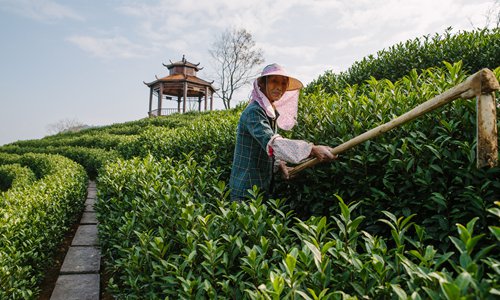
From the People’s Daily app.
This is Story in the Story.
Lujia village in Anji county, East China's Zhejiang Province, derives its name from Lu Ban, a Chinese carpenter, engineer and inventor during the Zhou Dynasty (1046BC-221BC). It is said a group of craftsmen settled in the area 500 years ago and established a village on the barren land.
Even now, the spirit of "creating something out of nothing" has influenced the local villagers, generation by generation.
The director of Lujia village, Qiu Liqin, went to the United Nations Headquarters in New York on September 26 as one of the representatives of Zhejiang Province to receive the Champions of the Earth Award. The province's Green Rural Revival Program won the award due to its successful cleanup of previously heavily polluted rivers and streams.
The Oscar-winning film Crouching Tiger, Hidden Dragon includes a martial arts fight scene shot in the bamboo backdrop at Anji county. The county has been praised for its efforts to champion ecological conservation, and for its production of the precious Anji white tea.
When President Xi Jinping, then secretary of the Zhejiang Provincial Committee of the Communist Party of China, visited Anji county in 2005, he said people should not promote economic development at the expense of the environment.
In order to bring a good ecological environment back, Xi launched the Green Rural Revival Program in Zhejiang, aiming to improve water protection, pollution prevention and ecological restoration.
Today's Story in the Story will look at how water protection and ecological restoration have brought the once shabby Lujia village to the world stage, and why the UN environment agency executive director said Zhejiang's villages will be examples for villages of China and the whole world to follow.
Tourists take the train to see local modern farms. (Photo: Global Times)
Cloud and mist remained in the bamboo forests in Lujia village after drizzle in the late autumn. The dew gathered on the bamboo leaves. In addition to the twitter of birds, what awakened villagers were "hello" and laughter from children. With years of water protection and ecological restoration, many villagers have moved into beautiful houses, living on tidy streets.
It is hard to imagine the now beautiful and clean town used to be dirty and poor.
Zhu Renbin, who was later elected as village secretary, said he didn't want to come back home after graduating from college during the 1990s, because the roads were so poor.
"After I finished my undergraduate studies and came home, I found nothing had changed in the town. It was exactly the same as in my childhood." He started to think about why other villages were changing but not his hometown.
Giving up his own business of sporting goods retailing in the county, Zhu was elected as village secretary in 2011 and vowed to make it thrive.
Working for a town administrated by Anji, Zhu and his colleagues directed their efforts toward environmental protection, and responded to the Green Rural Revival Program at early stage. However, there was no money available in the collective account, as a result, Zhu spent 85,000 yuan of his own money to buy trash bins, and he hired cleaners in Lujia village.
Unexpectedly, villagers didn't understand the policy and complained about sorting rubbish and putting it into trash bins.
Some villagers were used to dumping trash by the river, and said Zhu and his leadership went too far.
They also refused to demolish their old precarious houses, and were unwilling to move into new ones.
Qiu recalled one hot summer night when an old man scolded Zhu and her and told them to get out of his house, because he was not satisfied with the relocation compensation. The old man was hoping to get more money. Though suffering from injustice, Qiu walked toward the door and closed it, saying, "We should close the door in case mosquitos come into your house."
Qiu and Zhu couldn't remember how many nights like this they went through in 2011. "Maybe our hard work touched the villagers. Some of them offered a hand to persuade those who didn't support the village revival," Qiu said.
Under the Zhejiang River Chiefs program, Lujia village hired local women to manage bodies of water and supervise the environment, preventing and controlling pollution.

A woman works on a tea farm called Yingyuan, one of the 18 farms in Lujia village, Anji county, East China's Zhejiang Province on November 20. (Photo: Global Times)
A 37-year-old local villager said that she took over the job as a river chief from her mother-in-law seven years ago.
"I never thought that our village could develop like this. My daughter told me she felt so proud of being born in Lujia village," she said.
According to the UN environment agency, 97 percent of villages in Zhejiang have transformed their polluted waterways into clean, drinkable rivers, benefitting 30 million residents.
Zhu said he started the village revival by purchasing trash bins because he understood a good environment is the foundation to achieve rural revival. "Once the ecological environment is destroyed, it is very difficult to fix," he said, emphasizing the village would never welcome polluting enterprises or factories.
The pleasant environment has attracted investors.
Lujia village has received financing from various channels, such as reputable and rich villagers, the city government and local enterprises.
Zhu always said, "Let the professionals do the professional things!" In 2013, he invited professional rural planners to the village to create a development plan that was worth 3 million yuan.
In 2013, a 4.5-kilometer-railway was built in the village. It connects 18 farms in the town. Farms growing bamboo, vegetables, fruit and plants for traditional Chinese medicine are being built, and will be finished by next year.
Lujia village owes its success to its special operation model, known as "company-village-farm," Zhu said.
A tourism company is responsible for daily operation and marketing of the village. The village committee works on administration and coordination work, integrating resources of the government and the public. Farms focus on infrastructure construction and industrial upgrading.
"We want to introduce our operation model and experience to many other villages in China, in order to make their path easier," Zhu said. "Lujia village had success with ecological restoration. So can every village in China."
(Produced by Nancy Yan Xu, Brian Lowe, Lance Crayon, and Da Hang. Music by: bensound.com. Text from Global Times.)


